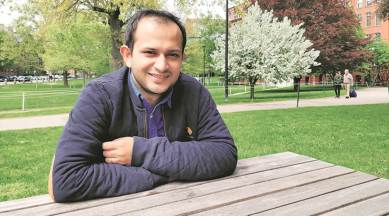📣 For more lifestyle news, click here to join our WhatsApp Channel and also follow us on Instagram
Sahitya Akademi award winner Tanuj Solanki on writing, and how Muzaffarnagar changed after 2013 riots
His short story collection Diwali in Muzaffarnagar that won the Sahitya Akedemi award explores what it means to leave a small town as a young adult, and to return home much later.

After writing short stories for newspapers and magazines, Tanuj Solanki, whose day job involves working for an insurance company in Mumbai, wrote his first novel, Neon Noon, in 2016. Published by Harper Collins, it received critical acclaim and was shortlisted for Tata Lit Live First Book Award. But it was his second book, Diwali in Muzaffarnagar, in 2018, which established him as a writer. The short story collection explores what it means to leave a small town as a young adult, and to return home much later. It has just got him the Sahitya Akademi Yuva Puruskar. Excerpts from an interview:
What were your expectations when you first started writing?
I first started writing with an impulse to imitate the writers I read. At some point during that initial ‘play’, I developed a sense of the fictions I wanted to create, and also some semblance of that thing called voice. The expectation since has always been to do it (the writing) well. I can think of no other expectations that I’ve had. Writing is, and has always been, a pleasure in itself.
What drew you towards writing?
I started when I was 23. Reading was my first pull, and, of course, a bit of silly arrogance — the arrogance of the non-practitioner: ‘If you can write a story like that. I can write it better’.
What prompted you to write stories on urban loneliness and life in small towns?
I never explicitly set out to write on or about these two areas, or broad experiences, so to say. Instead, what I’ve ended up writing has been understood through these terms. This is, perhaps, the result of readers and reviewers finding something to relate to in the material, something that they describe through these words. That’s perfectly natural, I guess.
Why did you think Diwali in Muzaffarnagar was better suited as a short story collection and not a novel?
Thematically, a short story collection can perhaps cover a greater range than a novel, which has to necessarily amplify a smaller range of experience. I must emphasise, though, that there was never a conscious choice for me between writing a novel or short stories. I wrote one story, had it published in a magazine, and realised that there could be more stories in the same universe. Thereafter, I was invested in the writing of these stories for a considerable period, without much thought paid to the novel form as an alternative. I might one day expand a story in the collection — Good People — into a novella.
Were you more comfortable writing stories set in your home town?
Mumbai, Delhi, Pattaya and Muzaffarnagar — these are the places where my characters have been till now. As all fiction writers, I try to ensure that wherever my characters are, they are uncomfortable (or, conflicted). My own comfort or discomfort doesn’t vary with where they are.
Post 2013, Muzaffarnagar became a household name but ever since, it’s referred to as the riot-prone town in the media. Does that disturb you?
Muzaffarnagar’s various communities have become more guarded, and more gated. That is what disturbs me, as I remember it as a more carefree place. The city has always been infamous for its crime rate, though, so I am not sure if my perception is correct. What is certain is that there is an added pressure on inter-religious interactions. Is it only in Muzaffarnagar, though? Isn’t that nationwide?
Which writers have influenced you? What books are you reading currently?
There are too many to name. I’m currently reading a Scandinavian crime novel called Echoes From The Dead by Johan Theorin. I’ve developed a taste for Scandinavian crime, the dour investigation procedures, the etiolated atmosphere, and the social tensions.
📣 For more lifestyle news, click here to join our WhatsApp Channel and also follow us on Instagram